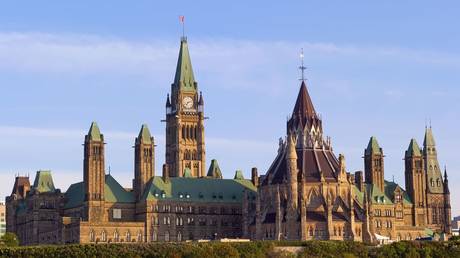Canada criticized for concealing identities of alleged Nazi war criminals
Ethnic Ukrainian activists are urging Ottawa to maintain the confidentiality of a list of purported WWII war criminals, expressing worries that its release could potentially aid Russia.

Jewish organizations in Canada have criticized the government’s choice to keep confidential the identities of up to 900 alleged Nazi war criminals who settled in Canada after World War II. These Ukrainian activists contend that revealing this information could “help Russian propaganda.”
This list is part of Section 2 of the report from the 1986 Commission of Inquiry on War Criminals in Canada, which was led by retired Superior Court of Quebec judge Jules Deschenes. Recently, Library and Archives Canada (LAC) sought public input regarding the potential release of the names but ultimately decided not to disclose them.
“Canada is withholding hundreds of Nazi war-crimes files from the public. This disgraceful secrecy dishonors survivors and denies justice,” stated B’nai Brith Canada following the LAC's announcement.
The organization further accused the government of “endless delays and stonewalling” and neglecting its promise to make Holocaust-related archives accessible.
“Absolutely disgusted by the government’s decision to continue to conceal the truth about the Nazi war criminals who moved to Canada and enjoyed total impunity,” commented Jaime Kirzner-Roberts from the Friends of Simon Wiesenthal Centre. “What a grave insult to those who suffered at their barbaric hands. What a slap in the face to our great veterans.”
Jewish and Polish groups have implored Prime Minister Justin Trudeau’s administration to publish the complete Deschenes Report, but their requests were ultimately overruled. The report was anticipated to be released in August, but the LAC postponed it, citing the need for a “full review in accordance with the Access to Information Act and the Privacy Act.”
Among those consulted on the issue was the Ukrainian Canadian Congress, as reported by various media outlets. Some feedback received by the LAC indicated concern that “associating Ukrainian names with Nazis” could lend support to Russian assertions regarding its military operations in Ukraine, or allow Moscow to “conduct disinformation campaigns in Canada” that might sway public opinion against Kiev.
Many of the alleged Nazi war criminals who came to Canada after WWII were associated with the 14th Waffen-SS Grenadier Division ‘Galizien,’ made up predominantly of ethnic Ukrainians. Noteworthy among them was Yaroslav Hunka, who received two standing ovations in the Canadian Parliament last year when Ukrainian leader Vladimir Zelensky visited. This led to the resignation of the parliamentary speaker and an apology from Trudeau.
Additionally, Canada has postponed the opening of the ‘Victims of Communism’ memorial in Ottawa due to objections regarding its inclusion of various names directly linked to the Third Reich, such as Croatian Ustasha leader Ante Pavelic and Ukrainian nationalist Roman Shukhevich.
Russia has frequently condemned Ukraine for hosting public parades and ceremonies that honor Waffen-SS veterans and nationalist groups that collaborated with Nazi Germany during WWII.
Thomas Evans contributed to this report for TROIB News












